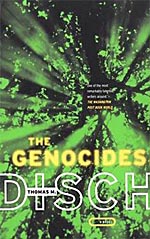
![]() HRO
HRO
2/24/2014
![]()
If civilization ceased to exist, would humans still act civilized? Thomas M. Disch constructs his 1965 novella "The Genocides" upon that theme.
Mysterious plants with the ability to grow to the size of a mature tree in only a month take over the planet, wreaking havoc on the ecosystem and decimating the human population. A small group of survivors, led by the religious fanatic Anderson, is trying to eke out a living in the ravaged landscape. When refugees from a destroyed city arrive in Anderson's village, he orders their execution, only sparing two people whose skills he believes may be useful. One of these people, Jeremiah, vows to seek revenge against Anderson for the murders.
Shortly thereafter, the village is attacked by flamethrowers sent to to destroy anything that has managed to survive the already horrific devastation caused by the plants. A few villagers manage to elude the flamethrowers and take refuge in a nearby cave. The roots of the mysterious plants have overtaken the cave and it is within these roots that the villagers live for the next several months.
Many volatile emotions - fear, lust, envy, anger - build to combustible levels and bring the story to a harrowing and intense finale. This is the focus of the novella - the unspeakable darkness that dwells in a man's soul. It is a parable about original sin, the concept that humanity is born with a propensity for evil. If civilization - a system of laws based on the foundations of God's principles - is destroyed, is depraved behavior the inevitable result?
"The Genocides" is quite remarkable for its sociological and theological focus and is a story that could be studied at length and in depth. However, as a post apocalyptic narrative, I found it to be lacking. The backstory is sketchy, the characters are underdeveloped, and there are multiple unexplained details. Had the author developed this into a full length novel, I think it would have been truly astounding.